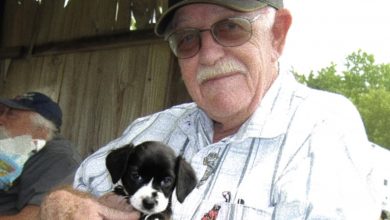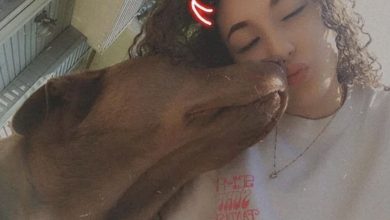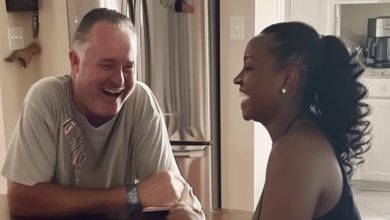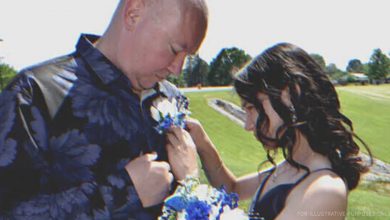“He Left His Mother to Die While Vacationing in Spain — But My One Phone Call Changed Everything”
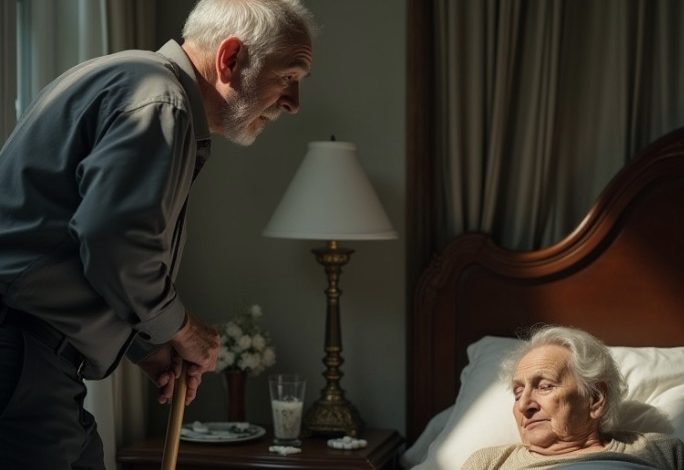
The key jammed in the lock when I tried to turn it. Three days after my knee surgery, even that small effort felt like climbing a mountain. My leg throbbed, and every movement reminded me that I wasn’t young anymore. When the door finally opened, the house greeted me with silence — a kind of heavy, suffocating silence that didn’t belong in a home that was supposed to be full of life.
No lights were on. No TV. No sound. Just darkness and still air.
“Helen?” My voice echoed strangely. “Chester?”
No reply.
I stepped inside, the cane tapping softly against the hardwood floor. I’d designed this house myself forty years ago — every beam, every detail. Now, as I moved through it, something about the space felt wrong. The curtains were drawn even though it was the middle of the day, and a faint smell of neglect floated in the air.
I called out again, louder this time, but my voice only hit the walls and came back empty.
When I reached the bedroom, the smell hit me first — stale air, sweat, something faintly metallic. Helen lay in bed, motionless, pale as the pillowcase beneath her. The water pitcher on her nightstand had fallen over, completely dry.
“Helen!” I rushed forward, forgetting about my injured knee. Her eyes fluttered open at the sound of my voice, and she tried to smile.
“Simon,” she whispered weakly. “You’re back.”
Her lips were cracked, her breathing shallow. I felt my heart sink into my stomach. “What happened? Where’s Chester? He was supposed to take care of you.”
Her eyes filled with a kind of shame that hurt more than anger ever could. “He left. Said he’d come back soon. It’s been three days, I think.”
Three days.
I looked at the tipped-over pitcher again. Helen had multiple sclerosis. She couldn’t move easily without her wheelchair — which I noticed, deliberately placed all the way across the room. She must have tried to reach it, failed, and collapsed back onto the bed. My own son had left her like this.
“Don’t be angry with him,” she murmured, her voice trembling. “He just needed some time away.”
I didn’t answer. I pulled out my phone and called emergency services. I didn’t shout, I didn’t panic. My voice came out steady — years of managing construction crises had trained me for calm under pressure.
When the paramedics arrived, they took one look at Helen and moved fast. “Severe dehydration,” one said. “How long has she been like this?”
“Three days,” I said flatly. “Her caregiver — my son — left her.”
The woman glanced at her partner, but said nothing. They lifted Helen onto a stretcher and carried her out.
I followed them to the hospital, my body aching, my mind numb.
When Helen was stable, I sat beside her bed and finally pulled out my phone. I needed to understand where Chester was. I opened his social media account. It took only seconds to find the answer.
A photo — my son on a sunny beach in Barcelona, holding a drink, smiling like he had no care in the world. The caption read:
Finally, a week without the pathetic old folks.
I stared at it for a long time. It wasn’t just the words — it was the laughter in his eyes, the complete absence of guilt.
I didn’t throw the phone. I didn’t yell. I simply took a screenshot and saved it. Proof.
The next morning, Helen was awake, fragile but alive. “You saw it, didn’t you?” she asked quietly.
“Yes,” I said.
She looked away. “He didn’t mean it, Simon. He’s just young. He gets frustrated.”
“You almost died because of him.”
She squeezed my hand. “He’s still our son. Please… promise me you won’t do anything rash.”
I couldn’t promise that. I kissed her forehead instead and said softly, “Rest now.”
When I got home later that day, I noticed immediately that someone was inside. The fridge door closed. I turned and saw her — Stephanie, my son’s girlfriend. She stood in my kitchen eating yogurt with one of Helen’s silver spoons.
“Oh,” she said casually, as if nothing was strange. “You’re back.”
“What are you doing in my house?” I asked, keeping my tone calm.
She shrugged. “Chester’s house. Technically. Eventually.” She smiled, a lazy, mocking smile. “He said it was fine for me to stay here while he’s away.”
“He doesn’t own this house.”
“Not yet,” she replied, tilting her head. “But old people don’t live forever.”
Her words hung in the air like poison.
“Get out,” I said quietly.
She laughed. “Make me. Chester’s your only kid. You wouldn’t dare throw me out. You wouldn’t even cut him off. You’re too old-fashioned.”
I looked at her for a long time, then turned and walked toward my study. “You’d be surprised what I can do.”
Once inside, I closed the door, locked it, and went straight to the safe behind the bookshelf — a small design detail I’d added years ago. Inside was my will. Everything went to Helen first, and then to Chester. My son, my heir.
I laid the document on the desk and stared at it under the soft green light of my old lamp.
Then I called Angela Ray, my attorney of twenty years.
“Angela,” I said. “I need to change my will. Remove my son completely.”
She hesitated. “That’s… significant, Simon. Are you sure you want to do this?”
“I’ve never been more sure of anything.”
“Come by tomorrow morning. We’ll take care of it.”
That night, I barely slept. I listened to the faint creaks of the house, the echo of Stephanie’s laughter as she moved about freely, treating the place as if it were already hers.
In the morning, I went to Angela’s office. I showed her the printed screenshots, the hospital reports, everything. She studied them silently.
“He left your wife without care,” she said finally. “That’s enough for anyone to make this decision.”
“I don’t want him to contest it after I’m gone,” I said. “He’d drag it through court.”
“Then you don’t need a new will,” she said, opening a folder. “You need a trust. Irrevocable and immediate.”
She explained it simply: a living trust would move everything into a foundation now — while I was alive. Chester couldn’t fight it. He couldn’t take me to court.
By that afternoon, the documents were ready. Every dollar, every property, everything I’d ever built went into The Helen Watkins Foundation — a future charity for in-home nursing care for families struggling with chronic illness.
“Once you sign,” Angela said, sliding the papers across the desk, “it’s done.”
I signed with my drafting pen, the same one I’d used to sign the final blueprint for this house decades ago.
When the ink dried, I said, “Now send him everything.”
Angela hesitated. “Are you sure?”
“Yes. Let him know what his freedom costs.”
She sent the email, attaching the legal documents. “He’ll receive it in minutes.”
An hour later, my phone began to ring. Chester’s name appeared again and again. I didn’t answer. By the tenth missed call, the voicemails started.
“Dad, I just got this email. What’s going on?”
“Dad, you can’t do this! You’re angry — you’ll regret it!”
“This is insane! I’m your son! You can’t just erase me like that!”
By the twentieth voicemail, the tone had shifted.
“Stephanie says we’re calling a lawyer. You’ll lose, old man. You’ll see.”
I listened to them all in silence, then turned off my phone and went to bed.
Helen came home from the hospital a day later. I’d hired a professional caregiver, Maria, who immediately took charge with quiet confidence. Helen was safe now.
“Is Chester coming today?” she asked weakly.
“Maybe later,” I said softly. “He’s traveling.”
He arrived six days later. I heard the door slam and his angry footsteps before I saw him.
“Dad!” he shouted. “What did you do?!”
I stayed seated in the living room. “Nice of you to visit, Chester. How was Spain?”
He looked furious. “Don’t do this! You gave everything away! To some charity?!”
“Your mother almost died,” I said evenly. “You left her to die.”
“It wasn’t like that! I just needed a few days—”
“Days that almost cost her life.”
“I’m sorry!” he shouted. “Okay? I messed up! Just change it back!”
“You posted that picture,” I reminded him. “You called us pathetic old folks.”
He swallowed hard, realizing I wasn’t bluffing.
Stephanie, who’d been waiting in the car, walked in just then. “You’re being cruel,” she said. “He’s your son.”
I turned to her. “You told me this house would be yours soon. Did you mean that?”
Her mouth opened, but no words came out.
Chester’s face twisted in anger. “I’ll sue! You’re not thinking clearly! You’re on medication!”
“The trust was made after I recovered,” I said calmly. “Two lawyers and a notary witnessed it.”
He stared at me like I was a stranger. “You’d really do this to me?”
“I didn’t do this to you, Chester. You did it to yourself.”
He turned red, muttered something under his breath, and stormed out.
Months passed. Helen grew weaker. On March 2nd, she passed away peacefully in her sleep. I sat with her, holding her hand until the end. Chester showed up drunk at the funeral, shouting that I had turned her against him. Two neighbors quietly led him out.
Afterward, I called Angela again. “They’re still in my house,” I said.
“Then we’ll remove them legally.”
It took weeks, but the eviction went through. Chester countered with a lawsuit claiming I was mentally unstable. The judge dismissed it immediately, calling it “spiteful and baseless.”
A few weeks later, my security cameras caught Stephanie rifling through my mail. I filed a report. They were gone within days.
I later learned they’d moved into a one-bedroom apartment on the outskirts of town. Stephanie got a retail job. Chester didn’t work. He drank. He gambled.
I sent one last letter through my lawyer, demanding repayment for Helen’s medical care. I didn’t expect him to pay; it was a lesson, not a demand.
Two weeks later, Stephanie left him. The landlord said Chester cried for days.
Then, one evening, he came to my porch — thinner, unshaven, eyes red.
“Dad,” he said, his voice breaking. “Please. Tell me what to do to fix this. I’ll work forever to make it right.”
I looked at him quietly. “When you left your mother alone, you made your choice. I’ve made mine.”
“So this is it?” he asked. “You’re done with me?”
“I was done with you the moment I saw that photo from Barcelona,” I said. “This is just the paperwork.”
He left without another word.
I sold the house soon after and moved into a small condo overlooking the bay. With what remained, I built The Helen Watkins Foundation, named after the woman who had always seen good in everyone — even in the son who didn’t deserve it.
The first grant went to a family caring for a paralyzed child. Seeing their gratitude reminded me that some people still knew what love and responsibility meant.
Sometimes I sit on my balcony at sunset, watching the light fade over the water. The phone buzzes with news about the foundation, photos of nurses helping patients, families smiling. Chester’s name never appears again.
And in the quiet of those evenings, I think about what he never understood: that taking care of someone isn’t a burden — it’s the truest form of love. And when you turn your back on that love, you don’t just lose an inheritance. You lose your place in the family, forever.


